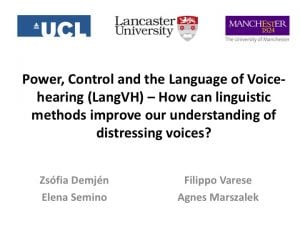It’s been a long time coming, but the first paper based on our pilot project is now available ‘online first’! It is also open access.
‘Metaphor framing and distress in lived-experience accounts of voice-hearing‘ explores the potential role of metaphor as a signal and determinant of distress in first-person accounts of voice-hearing by people with schizophrenia diagnoses.
We focused on metaphors because they are well known to both reflect and reinforce particular ways of making sense of subjective and sensitive experiences, including in terms of attributions of agency, power and control. We also know that the degree of distress experienced by voice-hearers depends, amongst other factors, on voice-hearers’ perceptions of the “power” of the voices, and on the extent to which the voices can control or be controlled by the person.
We identified and analysed metaphors in 10 semi-structured interviews with voice-hearers with diagnoses of schizophrenia-spectrum disorders. We focused in particular on metaphors that related to the phenomenology of voice-hearing and the relationship between voice-hearers and voices.
Divergent uses of metaphors framed the experience of voice-hearing in distinctive ways and were found to have different implications for perceptions of mutual power and control between voice-hearer and voices. Participants who used metaphors in which they are in disempowered positions tended to report higher level of distress, while participants who used metaphors in ways that constructed them as empowered tended to report lower levels of distress.
For more details, see the full paper in Psychosis.
 The second paper emerging from the Power, Control and the Language of Voice-hearing project is finally out in the form of a books chapter in Demjén, Z. (ed) (2020) Applying Linguistics in Illness and Healthcare Contexts. London: Bloomsbury. (more…)
The second paper emerging from the Power, Control and the Language of Voice-hearing project is finally out in the form of a books chapter in Demjén, Z. (ed) (2020) Applying Linguistics in Illness and Healthcare Contexts. London: Bloomsbury. (more…) Close
Close




 Grant from the UCL Institute of Education,
Grant from the UCL Institute of Education, 